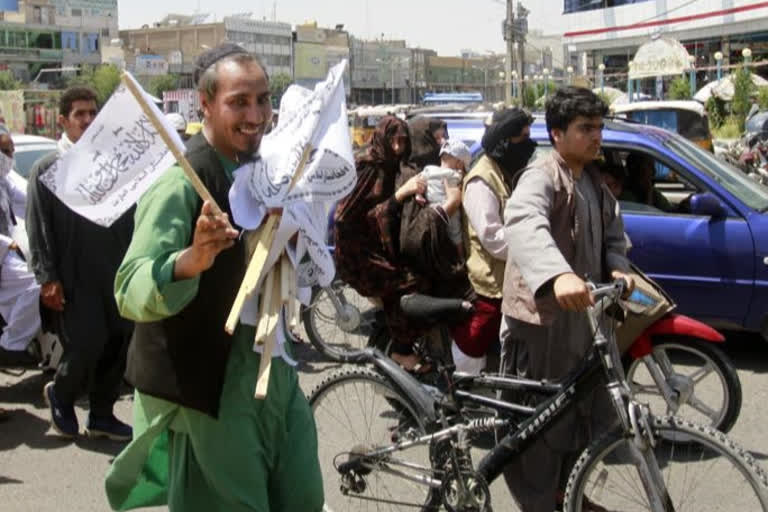Brussels: The European Union is suspending payments of development assistance to Afghanistan now that it has fallen to the Taliban but is weighing whether to boost humanitarian aid to the conflict-ravaged country. EU foreign policy chief Josep Borrell says there can be no payments of development assistance until we clarify the situation with Taliban leaders.
Speaking after chairing a meeting of EU foreign ministers Tuesday, Borrell said the Taliban must respect UN Security Council resolutions and human rights to earn access to the funds. Borrell says that humanitarian help will continue, and maybe we will have an increase, given the number of displaced Afghans, the ongoing drought, and the impact of the coronavirus pandemic. The 27-nation bloc has pledged about 1.2 billion euros (USD 1.4 billion) in development assistance for Afghanistan for the period 2021-2024.
SOFIA:
Bulgarian leaders have signed a joint statement saying Afghans should be allowed to leave the country if they wish, the Balkan nation's foreign ministry announced on Tuesday. The statement followed an emergency meeting of a national security council called by Bulgarian President Rumen Radev to discuss measures to address the increased migratory pressure on the Bulgarian-Turkish border. It noted that all temporary accommodation centres in Bulgaria are already overcrowded with migrants from Afghanistan, Syria and Iraq.
Bulgaria saw hundreds of thousands of migrants pass through its territory and continue to western Europe during the height of the migrant crisis. Since then, Bulgaria erected a razor-wire fence along most of its 269-kilometre border with Turkey. There is no fence on the border with Greece, but army units have been deployed occasionally to help police patrol the frontier. Bulgarian public opinion has been largely opposed to the arrival of migrants and asylum seekers during previous migrant waves.
THE HAGUE:
The chief prosecutor of the International Criminal Court says he is closely monitoring events in Afghanistan and is most concerned by recent reports of escalating violence in the country. Prosecutor Karim Khan said in a statement on Tuesday that he echoes views expressed by the UN Security Council over incidents he says may amount to violations of international humanitarian law. He says they include allegations of extrajudicial executions in the form of revenge killings of detainees and individuals who surrendered, persecution of women and girls, crimes against children and other crimes affecting the civilian population at large.
The Hague-based court has already opened an investigation into crimes in Afghanistan dating back to May 2003. Khan says he calls on all parties in the country to fully respect their obligations under international humanitarian law, including by ensuring the protection of civilians. I remain available and willing to engage with all parties to this end.
GENEVA:
Dozens of demonstrators have staged a rally outside the UN's Geneva compound to call for respect for women, freedom of expression, and other human rights in Afghanistan after the Taliban seized power from the country's government. The demonstrators on Tuesday called for continued schooling for women and girls which was banned during the Taliban's previous rule in the late 1990s and held up banners such as We want peace and Help Afghanistan out.
Several demonstrators draped themselves in red, green and black Afghan flags, which has been replaced by a white Taliban flag on some official buildings in Afghanistan after the insurgents drove out President Ashraf Ghani's government. Many women, and some girls, took part in the rally.
Two women held up a sign that read: The world should not allow Afghanistan to become a prison and a deathtrap for women. The protest took place at the foot of the landmark three-legged chair outside the U.N. Geneva compound, a site that regularly hosts demonstrations about a vast array of grievances and human rights concerns.
MOSCOW:
Uzbekistan on Tuesday denied media reports claiming that Afghan President Ashraf Ghani sought refuge in Uzbekistan as the Taliban swept into Kabul over the weekend. Ghani left the Afghan capital on Sunday and his whereabouts have since remained unknown, with ex-Soviet nations of Kazakhstan and Tajikistan denying taking him in.
The Uzbek Foreign Ministry's news agency Dunyo said on Tuesday that media reports about the alleged presence of Ghani, as well as former Afghan warlords Abdul Rashid Dostum and Ata Mohammad Noor and others, in Uzbekistan were, according to official information, not true.
In Stockholm, meanwhile, Swedish Prime Minister Stefan Lofven said on Tuesday that it is unclear how the Taliban intend to govern the country. Unfortunately, the prospects for the peace talks are very uncertain. We will not abandon the Afghan people, he wrote on Instagram.
But Sweden will need to shift parts of its aid to Afghanistan after the Taliban take power. We will not in any way provide any assistance to the Taliban. Since 2013, Afghanistan has been the largest recipient of Swedish aid.
Also read: Explainer: What the Taliban takeover means for Afghanistan
(AP)



